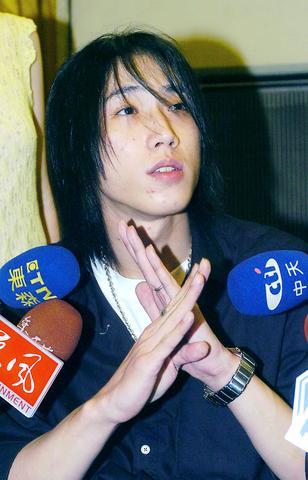The death of Hsu Tzu-ting (
"If I could do things all over again, I would never do such a thing. I'm really really sorry," Bo said in a press conference on Monday, apologizing to Hsu's parents. She said she did not know Yu was seeing someone else. "It wasn't until Hsu called me one day on Yu's phone number, telling me to drop out of the threesome [that I found out]," Bo said.

PHOTO: TAIPEI TIMES
The controversy behind the suicide has even spread into the TV newsroom, causing celebrity anchor woman Chang Ya-chin (

PHOTO: TAIPEI TIMES
student named Candy. Chang reported Candy's school, age (19) and displayed her photos, even her vital statistics. The next day Chang intended to do a follow-up about Candy, but had an argument with the Vice President of Era News Chen Cheng-chung (陳承中), who wanted to halt reporting about Candy, because of her young age. According to Apple Daily, after the quarrel Chang cried in the office and then offered to resign.
Hong Kong media report that Michelle Yeoh (
Yeoh was said by the Apple Daily to have admitted the reports were true. The action actress and former James Bond girl first met Todt during a Ferrari promotional event in Shanghai in June. Interestingly, she was introduced by her former boyfriend, Thomas Chung (
The film will be directed by Rob Marshall, director of Chicago. Shooting will start in September in both LA and Japan. Yeoh will play the teacher training Zhang to become a geisha. Gong Li (
Desperate seeking attention, Chinese actress Bai Ling (
"He is so romantic, he spends such a lot of time flying to Taipei, just to take a look at me!" Bai said in a seductive tone. Bai once told Hong Kong media she had 50 boyfriends and therefore was a sex expert. She said that she became sexually experienced in America when she was developing her acting career. "I enjoy sex. Sex is a kind of beauty, and orgasm is a state of Zen," Bai said. She added, however, "In China, I don't even talk about sex."

Aug. 25 to Aug. 31 Although Mr. Lin (林) had been married to his Japanese wife for a decade, their union was never legally recognized — and even their daughter was officially deemed illegitimate. During the first half of Japanese rule in Taiwan, only marriages between Japanese men and Taiwanese women were valid, unless the Taiwanese husband formally joined a Japanese household. In 1920, Lin took his frustrations directly to the Ministry of Home Affairs: “Since Japan took possession of Taiwan, we have obeyed the government’s directives and committed ourselves to breaking old Qing-era customs. Yet ... our marriages remain unrecognized,

During the Metal Ages, prior to the arrival of the Dutch and Chinese, a great shift took place in indigenous material culture. Glass and agate beads, introduced after 400BC, completely replaced Taiwanese nephrite (jade) as the ornamental materials of choice, anthropologist Liu Jiun-Yu (劉俊昱) of the University of Washington wrote in a 2023 article. He added of the island’s modern indigenous peoples: “They are the descendants of prehistoric Formosans but have no nephrite-using cultures.” Moderns squint at that dynamic era of trade and cultural change through the mutually supporting lenses of later settler-colonialism and imperial power, which treated the indigenous as

An attempt to promote friendship between Japan and countries in Africa has transformed into a xenophobic row about migration after inaccurate media reports suggested the scheme would lead to a “flood of immigrants.” The controversy erupted after the Japan International Cooperation Agency, or JICA, said this month it had designated four Japanese cities as “Africa hometowns” for partner countries in Africa: Mozambique, Nigeria, Ghana and Tanzania. The program, announced at the end of an international conference on African development in Yokohama, will involve personnel exchanges and events to foster closer ties between the four regional Japanese cities — Imabari, Kisarazu, Sanjo and

By 1971, heroin and opium use among US troops fighting in Vietnam had reached epidemic proportions, with 42 percent of American servicemen saying they’d tried opioids at least once and around 20 percent claiming some level of addiction, according to the US Department of Defense. Though heroin use by US troops has been little discussed in the context of Taiwan, these and other drugs — produced in part by rogue Chinese Nationalist Party (KMT) armies then in Thailand and Myanmar — also spread to US military bases on the island, where soldiers were often stoned or high. American military policeman